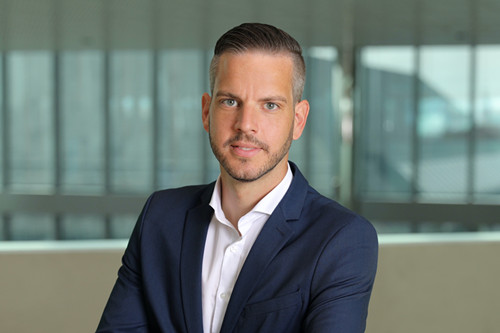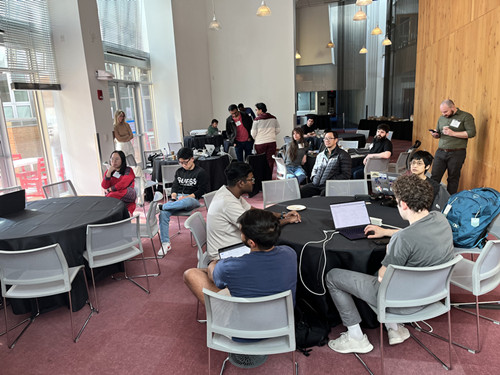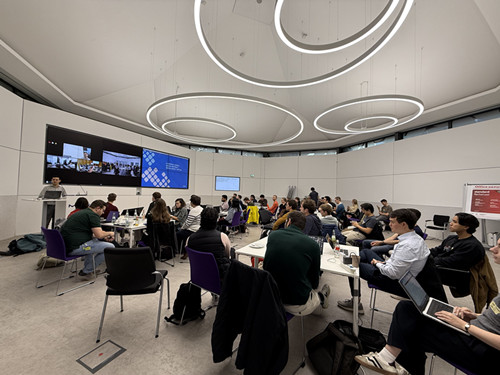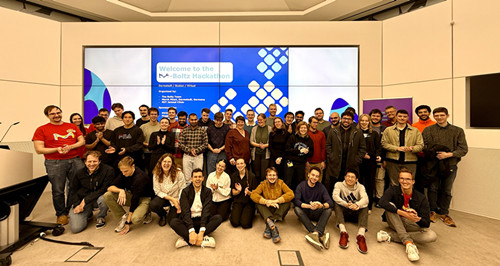Home > News > Global Hackathon by Merck and Boltz Sets New Benchmark for AI-Driven Protein Structure Prediction
Global Hackathon by Merck and Boltz Sets New Benchmark for AI-Driven Protein Structure Prediction
- * Global collaboration: scientists, engineers and innovators united across continents to advance AI-driven protein structure prediction
* Winning teams improved precision in antibody structure prediction, allosteric binder discovery and model performance
* Powered by leading tech partners: AWS, NVIDIA, Hugging Face, with support from MIT Jameel Clinic
Merck, a leading science and technology company, hosted the M-Boltz Hackathon together with the Boltz team. This hybrid event on protein folding, spanning Darmstadt, Germany, and Cambridge, Massachusetts, U.S., has set a new benchmark for AI-driven innovation in drug development. Boltz is an open-source AI model for predicting protein structures and binding affinities in a single framework.
“We are more than a participant at this hackathon – we’re co-innovators. Our scientists have already made significant contributions to the development of Boltz’s features. Now, through the M-Boltz Hackathon, we are taking the next step by bringing together scientists from different disciplines and global partners to further advance Boltz and its workflows,” said Philipp Harbach, Global Head of Group Digital Innovation at Merck. “This collaboration is of strategic importance to Merck. Our in-house protein engineering suite is leveraging Boltz. By improving it, we are directly enhancing our in-house capabilities, creating a symbiotic relationship between open-source development and our proprietary tools.”

Boltz has quickly become a highly sought-after tool in the pharmaceutical industry, rivalling the capabilities of competing proprietary products. The tool’s open-source nature is its key advantage, making it accessible to all – whether pharmaceutical companies or academia. Boltz is fast, accurate and accessible and was designed to democratize cutting-edge protein science for students, academics and industry experts alike.
“Boltz is already integrated into many research workflows at Merck, and this hackathon takes its impact to the next level,” Harbach said.

The hybrid hackathon connected participants across two main hubs – the Merck headquarters in Darmstadt and at the Stata Center on the campus of the Massachusetts Institute of Technology (MIT) in Cambridge, Massachusetts, U.S. – with approximately 50 participants per hub and an over 50 people joining virtually.

“It’s exciting to witness researchers across sectors and continents working side-by-side on some of the most difficult challenges in biomolecular science, leveraging state-of-the-art AI models in a spirit of openness and collaboration”, said Gabriele Corso, Boltz co-creator/co-author.

The teams tackled three focused challenges:
* Improving Boltz’s predictions with one challenge focusing on antibody-antigen complexes and another one on allosteric small-molecule binders. An independent evaluation was performed on an internal dataset provided by Merck.
* Improving the computational scalability of the Boltz-2 model as a dedicated challenge.
* Open-ended contributions to the code base or curated datasets for model training and evaluation.
Winning teams
The hackathon concluded with the announcement of the three winning teams at this year’s 7th Molecular Machine Learning Conference (MoML 2025) in Cambridge, Massachusetts, U.S.
The winning teams are:
Allo/Ortho Challenge:
* Winning team: Philipp Uhl (University Regensburg)
* Second place: Rémi Cazelles
Antibody Challenge:
* Winning team: Erik Kubaczka (TU Darmstadt), Jan Krumbach (TU Darmstadt), Mushtaq Ali (Karlsruhe Institute for Technology), Alexander Betz (OmiScouts GmbH), Augustin Harter (TU Darmstadt)
* Second place: Arunodhayan Sampathkumar (TU Chemnitz)
Compute Challenge:
* Winning Team: Nele Quast (University of Oxford), Aaron Schöne, Niklas Abraham
The winning projects demonstrated groundbreaking advancements in areas such as:
* Antibody structure prediction
* Allosteric binder discovery
* Model performance optimization
Sponsors and technology partners
The M-Boltz Hackathon was supported by leading technology partners:
* AWS provided robust data infrastructure and Amazon SageMaker for scalable model deployment.
* NVIDIA contributed on-site mentors and sponsored prizes.
* Hugging Face sponsored prizes, promoted a transparent leaderboard and is driving continued collaboration beyond the hackathon through its open-source community initiatives.
By fostering this collaboration, Merck is ensuring that the latest innovations in AI-driven molecular structure prediction are seamlessly integrated into its research efforts, potentially revolutionizing drug discovery and development processes while strengthening its position at the forefront of digital innovation.
About Merck
Merck, a leading science and technology company, operates across life science, healthcare and electronics. More than 62,000 employees work to make a positive difference to millions of people’s lives every day by creating more joyful and sustainable ways to live. From providing products and services that accelerate drug development and manufacturing as well as discovering unique ways to treat the most challenging diseases to enabling the intelligence of devices – the company is everywhere. In 2024, Merck generated sales of € 21.2 billion in 65 countries.
Scientific exploration and responsible entrepreneurship have been key to Merck’s technological and scientific advances. This is how Merck has thrived since its founding in 1668. The founding family remains the majority owner of the publicly listed company. Merck holds the global rights to the Merck name and brand. The only exceptions are the United States and Canada, where the business sectors of Merck operate as MilliporeSigma in life science, EMD Serono in healthcare, and EMD Electronics in electronics.
All Merck press releases are distributed by e-mail at the same time they become available on the Merck website. Please go to www.merckgroup.com/subscribe to register online, change your selection or discontinue this service.
Related News
- Wnt3a Cytokine: A Multidimensional Exploration from Molecular Characteristics to 12/31/2026
- Unlocking the Potential of CD20-Targeted CAR-T Therapy: Advancing Treatment for 1/30/2026
- MetP Pharma’s Neural Targeting Drug Delivery Technology Sets a New Benchmark for 1/30/2026
- CD182 Antibodies: Deciphering CXCR2’s Multifaceted Roles in the Tumor Microenvir 1/29/2026
- Lifeasible Launches Enhanced Bulk Segregant Analysis Service to Boost Plant Bree 1/29/2026
- Eyestem Receives CDSCO Approval to Initiate Phase 2 Randomized, Controlled Human 1/28/2026
- CD172a Antibodies: A Cornerstone Tool for Immune Regulation Research 1/27/2026
- CD170 Antibodies: Blocking Myeloid-Derived Suppressor Cell-Mediated Tumor Immune 1/26/2026
- CD163 Antibodies: Targeted Delivery Systems for Promoting Vascular Regeneration 1/25/2026
- CD14 Antibodies: Deciphering Dual Regulatory Mechanisms in Inflammasome Activati 1/24/2026


